Sustainable Consumption
Rising disposable income levels have led to more comfortable lives for current generations. But as our affluence grows, so does our consumption of goods and services. This in turn generates waste, with the amount of waste disposed of in Singapore increasing by over seven times over the last 40 years.
How we consume is influenced by social norms, such as pressure to over-order food at meals, keep up with fashion trends, or get the latest mobile phone model.
To promote more sustainable consumption, we need to do more and better with less. This can be achieved by having a reduce and reuse mindset, and by shifting towards the use of green products.
REDUCE
To reduce waste, we need to be conscious consumers, mindful of the materials and energy poured into every product or meal.
The ongoing fight to curb food waste
The battle to cut food waste is intensifying, with more organisations joining hands to spread the message of sustainable consumption.
The NEA launched a food waste reduction publicity and outreach programme in November 2015 to raise awareness of Singapore’s food waste situation and encourage consumers to adopt smart food purchase, storage and preparation habits to help them minimise food wastage.
Informational advertisements and educational videos on practical ways to reduce food waste were featured on various mass media platforms to reach the public. A comprehensive handy guide was also developed and made available online and distributed at community events. It provided tips on reducing food waste in different scenarios, such as when cooking at home, eating out or organising events.
The NEA has been ramping up engagement efforts, such as talks, food waste reduction demonstrations and other activities with support from the Food Waste Reduction Ambassadors (FWRAs) programme. To date, more than 400 ambassadors have been trained to help spread the word on food waste reduction to their communities, families and friends.
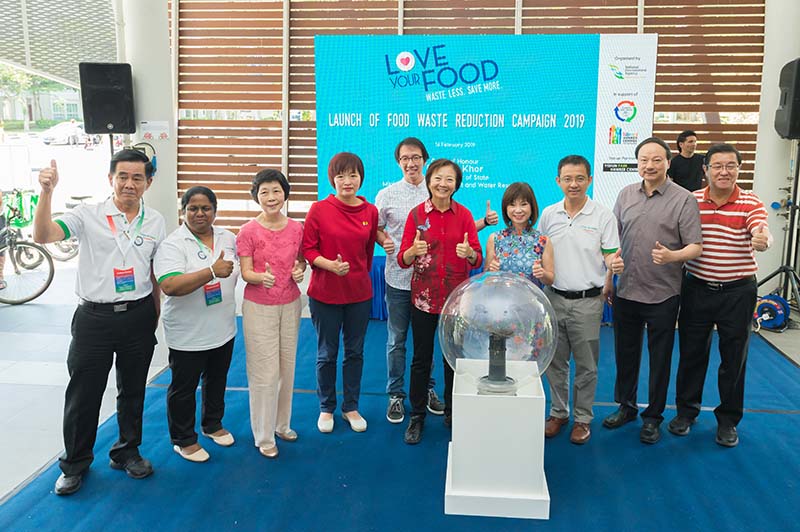
Four years on, as part of the 2019 Year Towards Zero Waste, the NEA partnered 25 hawker centres and organisations such as Dairy Farm Singapore, NTUC FairPrice, Prime Supermarket and Sheng Siong Supermarket, as well as schools and Institutes of Higher Learning, to engage consumers at points-ofconsumption.
Together, they promote three key actions that consumers can adopt to reduce food waste – order only what you can finish, ask for less rice or noodles if you cannot finish them and to say “no” to side dishes you will not eat.
Among the campaign’s features were visual reminders, such as wobblers, table-top stickers, wallscapes and pillar wraps, and an edutainment web series that inspires viewers to incorporate food waste reduction practices into their day-to-day lives.
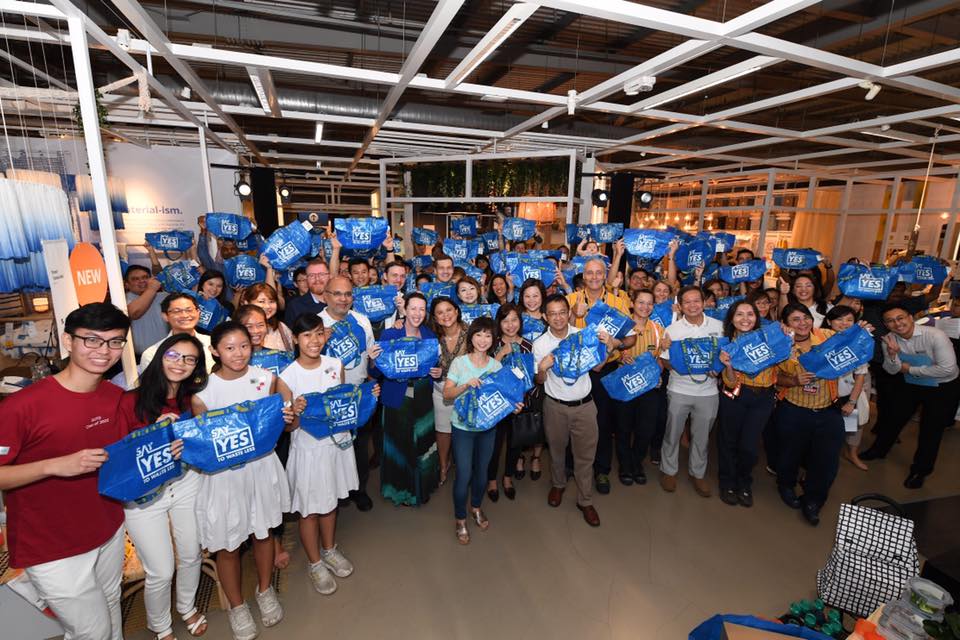
Tackling single-use disposables
Just as important is the need to address the problem of disposables that are often used for only a short period before being thrown away.
The Say YES to Waste Less campaign was launched on 8 June 2019 to build public awareness on excessive consumption, the impact on Singapore’s environment and future generations, and the need for reduction.
With the campaign message, “Make the Right Choice. Choose Reusables”, consumers were encouraged to take simple, actionable steps to reduce their impact on the environment. They could start simply by using a reusable bottle, bag or food container instead of disposables.
At its launch, the campaign brought together 59 partners, with support from over 1,600 outlets and premises from across the F&B, retail, commercial and community sectors. These partners helped to nudge consumers to make the right choice at points of consumption using a wide range of initiatives. These included visual reminders at cashier points, training of cashiers and providing incentives for using reusables.
The campaign also included district events and 100 roadshows in collaboration with the community to build awareness and encourage action.
To further reduce the use of disposables, the NEA disallowed their use for dine-in at new hawker centres such as at Our Tampines Hub, Pasir Ris Central and Yishun Park. The NEA has also extended this requirement to new stallholders operating in existing hawker centres.
There has also been increasing support from the private sector to tackle the excessive use of disposables. Several F&B retail outlets such as KFC Singapore, Burger King Singapore and Resorts World Sentosa no longer provide plastic straws at their outlets. Yakult Singapore also started selling its probiotic cultured milk drink without straws.
Packaging-free grocery stores have also emerged, where packaging is eliminated. They encourage customers to bring their own containers, and allow them to buy what they need instead of a pre-packaged amount. These stores also offer more competitive prices as going without packaging reduces the cost of its products by an estimated 10%, allowing customers to save both the environment and money.
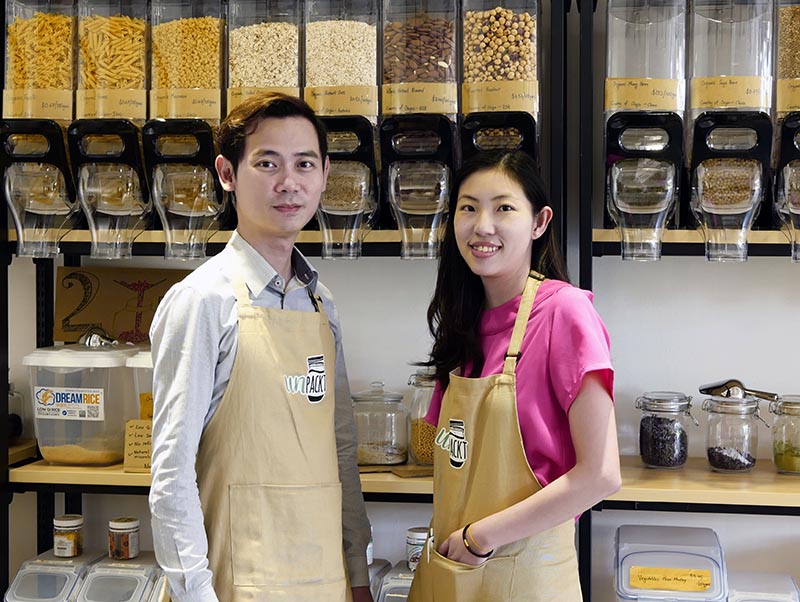
REUSE AND DONATE
How often have you thrown away a pair of jeans still in mint condition because it no longer fits, or a rice cooker that broke down after just a couple of months?
Often, these items can be repaired, donated or sold second-hand. We want to establish a habit of reuse in the community, such that we will not easily discard unwanted or faulty products.
To promote the repair trade, the NEA has allocated space in some hawker centres for businesses which repair small household appliances or clothing, and will continue to explore new ways to make it more convenient for people to repair their goods. This includes compiling a list of repair options in Singapore.
Another avenue is to equip Singaporeans with basic repair skills and empower more individuals to enter the repair trade. Therefore, we are supporting nongovernmental organisations (NGOs) and corporates, such as Repair Kopitiam , to promote repair workshops and courses in the community.
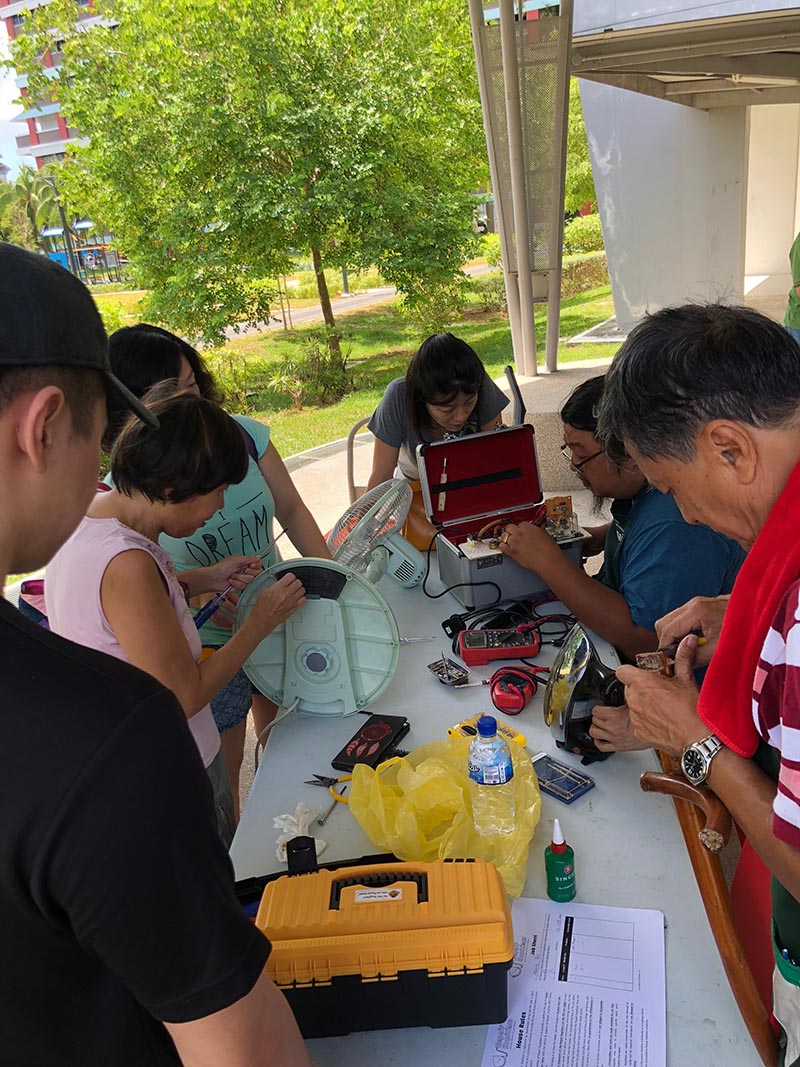
We can also tap on existing platforms to share or buy second-hand items, such as mobile applications or physical stores. To facilitate the sharing of less frequently used items in the neighbourhood, such as ladders and trolleys, the People’s Association (PA) launched Resource Centre @ Residents’ Committee (RC) in 2016.
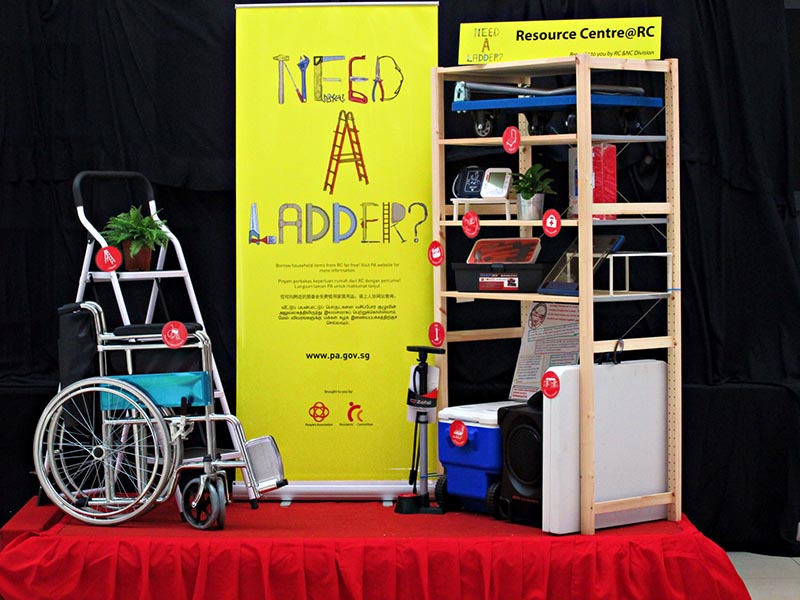
However, many Singaporeans are still unfamiliar with what they can do with their used clothing, shoes, bags and other reusables. Instead of donating these items, they often discard them in the blue recycling bins. Therefore, the NEA will be studying how to make donating more convenient, going beyond the list of second-hand shops and donation points currently found on its website. This could include making donation stations accessible to more Singaporeans.
As for the donation of excess food, the NEA and Singapore Food Agency (SFA) have produced a set of guidelines to promote food safety, which includes how to manage pre-packed or perishable food, and transport donated food to recipients.
To further nudge people to donate extra food, the NEA will be working with SFA, National Volunteer & Philanthropy Centre (NVPC) and other stakeholders on new initiatives. One such possibility is a Good Samaritan Law, which has been implemented overseas to provide legal protection to food donors.
PROMOTE GREEN-LABELLED PRODUCTS
Spending your money on environmentally-friendly products is a powerful way of endorsing a greener planet. The Singapore Green Label Scheme (SGLS), the NEA’s Mandatory Energy Labelling Scheme (MELS) for household appliances, and Logo for Products with Reduced Packaging support such decisions as they identify products with minimum environmental impact or are made with recycled, recyclable or less materials.
Not only do we want more companies to design their products with environmental considerations or import more greenlabelled products, but we also want them to adopt a green procurement policy.
The Government has adopted a green public procurement policy under the Public Sector Taking the Lead in Environmental Sustainability (PSTLES) initiative. For example, all Government agencies are required to purchase energy efficient appliances with minimum MELS ticks, and white printing paper certified by SGLS.
https://www.towardszerowaste.sg/zero-waste-masterplan/chapter2/sustainable-consumption/
